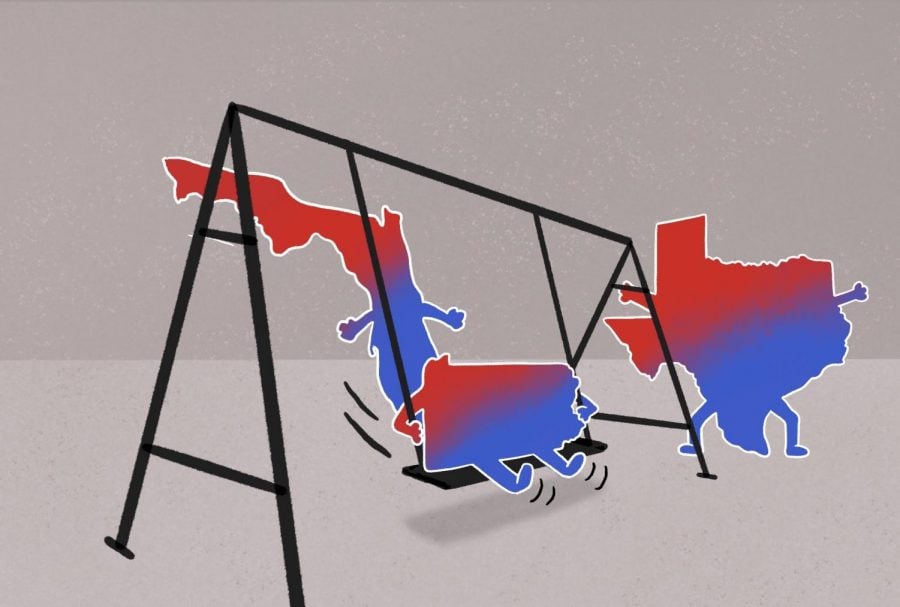Students reflect on living in key swing states during contentious election cycle
Illustration by Carly Schulman
Many Northwestern students will vote in key swing states this election cycle. As the polling margins between Trump and Biden in Texas, Florida and Pennsylvania narrow, some students are reflecting on what their vote means.
November 3, 2020
Have you ever wondered what it’s like to live in the same congressional district as the President of the United States?
SESP junior Sterling Ortiz doesn’t have to — he lives in Florida’s 21st district, voting in the same county as Mar-a-Lago resident President Donald Trump.
“After every election… you’re always on edge,” Ortiz said. “Always ready that somebody’s going to be racist to you at the Publix. You’re always stressed out. And there’s always pain. I say as somebody who votes Democratic, it’s just not fun. Especially now that there’s the possibility that Election Day might be Election Week, or Election Month — oh boy, do I not want to be in Florida for that.”
Ortiz is one of many of Northwestern students from a key swing state this election cycle. As a Florida voter currently living in Cook County, Ortiz said Democratic Illinois voters often take for granted that their presidential pick will win the state’s 20 electoral votes each year. For Ortiz, there’s much more room for disappointment: it’s almost always going to be a very close election.
This year may or may not look different, with Biden leading in recent state polls by only three points. One element of former Vice President Joe Biden’s Florida campaign strategy that Ortiz has been “genuinely obsessed” with is their effort to avoid generalized advertising towards Latinx and Black voters. Instead, Ortiz has seen ads specifically targeting Miami Venezuelans and Puerto Ricans, and has heard Harris do interviews on local Hatian radio networks in an effort to connect with West Indian demographics.
“That impresses me as a Latino, as someone who has a strong sense of heritage,” Ortiz said “It’s a sign of respect. I’m not sure how it will translate to votes, but I appreciate that respect.”
However, Ortiz added he’s “very thankful” to not physically be in West Palm Beach, one of the most valuable and saturated media markets in the state.
But for students completing the quarter remotely from home — like Communication junior and Pennsylvania resident Brandon Acosta —- there’s no avoiding getting caught in the crosshairs as Biden and Trump vie to bring renewed meaning to the term “battleground state.”
Pundits have declared Pennsylvania as the state most likely to decide the presidential election. With 20 electoral votes up for grabs and five points between the presidential hopefuls, constant campaigning has ensued from both sides — especially in Acosta’s home base of Lawrence County, a “mixed bag” of Democrat and Republican voters.
“I get texts and political phone calls all the time,” Acosta said. “It’s super annoying. Like yes, I voted. How many times do I have to tell you that?”
Acosta said this election has been especially intense. He can’t drive down the street without seeing waves of alternating Biden and Trump yard signs, flags and bumper stickers. One week there will be a socially distanced Democratic organizing event near his home, while the next there will be a Women for Trump rally. Many of his friends have mobilized to phone bank or sell merchandise.
Despite the excitement he felt with voting in his first presidential election, Acosta said he’s been torn on how to feel about the importance of his swing-state vote.
“At first I’m like, ‘Oh, like I have a little bit of clout because my vote is super important,’ and that’s a really interesting dynamic,” Acosta said. “But then I get mad about it, because why should my vote matter more than anyone else’s because of how flawed the electoral college system is? My decision really does have an impact on the whole country and that’s just not fair, you know?”
Voting also carried heavy weight for Texas resident Annie Goss. The SESP sophomore admitted she was “honestly pretty nervous” to vote in-person, noting that although the physical process was quick and easy, multiple people approached her outside of her voting location to inquire who she was voting for.
While Texas has historically been a red state, polling averages from RealClearPolitics has shown its 38 electoral votes down to one point between Trump and Biden — alluding to a potential blue swing for the first time since the 1976 presidential election. Goss said that partisan shift has been noticeable in her slightly red pocket of Harris County, one of Texas’s largest and most diverse districts.
“I’m not sure if it’s COVID-19, or the Black Lives Matter movement, or Trump as a president, but a lot of people —- many who’ve previously been straight ticket Republican — have changed their minds, and it’s really shown in my neighborhood,” Goss said. “I’ve even seen houses that had Trump signs up a few months ago now have Biden signs.”
Goss said she’s excited for the path Texas is on, noting that even if Biden doesn’t clinch the election, these shifts are putting the state in a position to become “a more accepting and blue place.”
She added that it’s rewarding to be living in a place where pushing her friends to vote can truly make a difference, especially considering how securely blue Cook County is.
“Encouraging my friends who go to school in Texas to get out there and actually vote and care about politics has been really special,” Goss said. “It just feels like an opportunity to get your voice heard even more than voting already does.”
Email: daisyconant2022@u.northwestern.edu
Twitter: @daisy_conant
Related Stories:
— The Daily Northwestern’s 2020 election guide
— First time voters get excited to cast their ballots
— Evanston, Chicago residents ineligible to vote work to mobilize peers and communities



